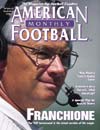AMERICAN FOOTBALL MONTHLY THE #1 RESOURCE FOR FOOTBALL COACHES
Article CategoriesAFM Magazine
|
FrantasticDennis Franchione creates winning teams wherever he goes.by: Jane Musgrave © More from this issue When Texas Christian University stomped Arkansas State in its third game this year, it was more than just another win in a season that is supposed to put the once hapless team on the map. The 52-3 drubbing stretched the Horned Frogs' winning streak to eight - their longest since 1938 and the fourth longest in the country. TCU Coach Dennis Franchione shrugs amicably when asked about the historic victory. "The only stat I worry about is the 'W,'" he says. Franchione's nonchalance about setting, breaking or even shattering school records is understandable. For the 49-year-old coach, record-breaking victories have become almost routine. In 1998, his first at TCU, he led the Horned Frogs to their first bowl victory in 41 years with a surprise 29-18 win over Southern Cal in the Sun Bowl. The....The full article can only be seen by subscribers.
|
|
|||||||
| HOME |
MAGAZINE |
SUBSCRIBE | ONLINE COLUMNISTS | COACHING VIDEOS |
Copyright 2025, AmericanFootballMonthly.com
All Rights Reserved





